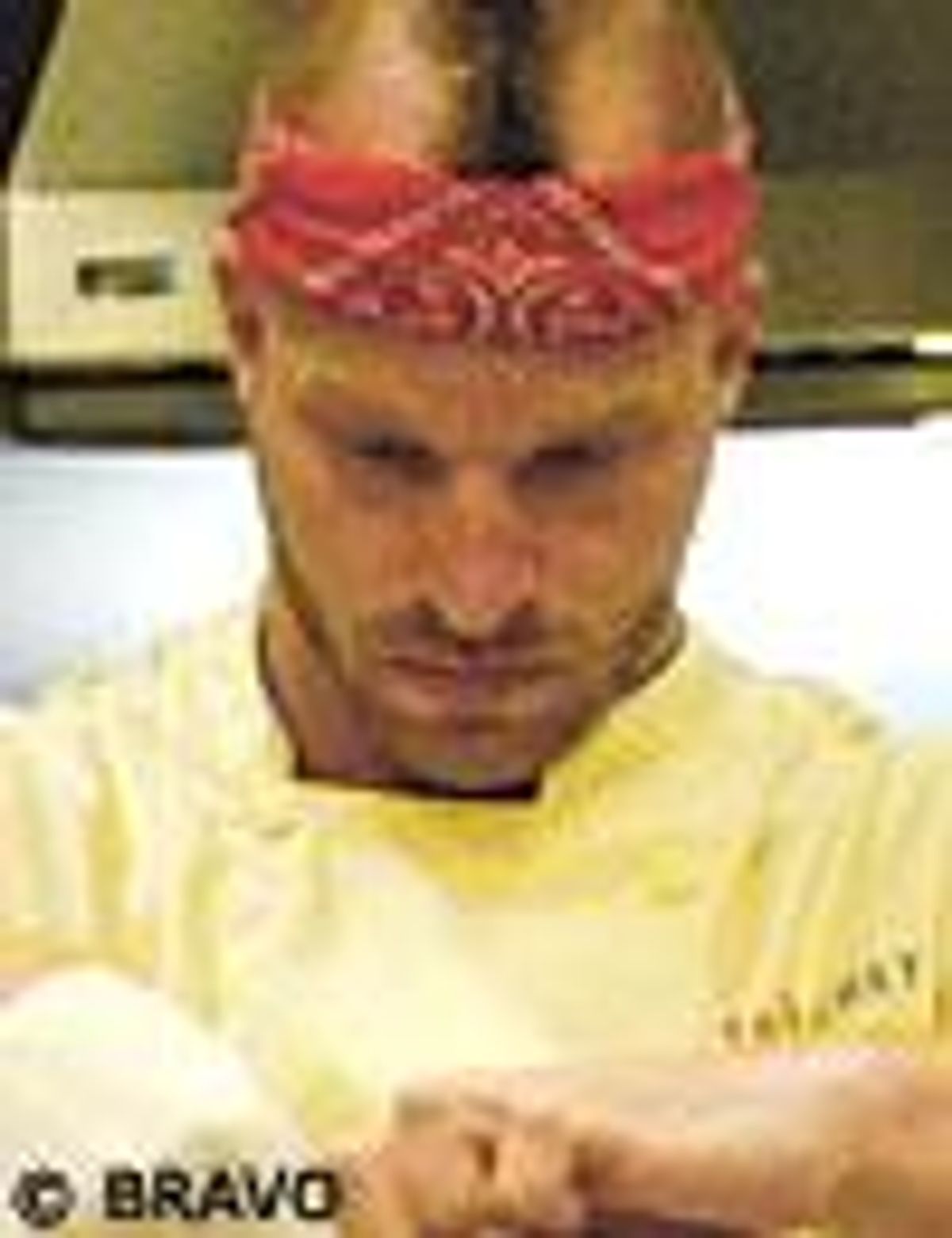"I'm a big gay chef and I'm gonna
outcook your ass!" So declared Dale Levitski,
the memorably driven Chicago chef with the fauxhawk on
season 3 of Top Chef, the Bravo reality series
that has fueled many a foodie's addiction.
Although he lost in the final round, Levitski was
certainly victorious in one regard: showing America
that gay chefs can take the heat in even the most
high-profile kitchens.
Levitski, 34,
who's planning to open his first restaurant in
Chicago this spring, would be the first to admit that
as an out and proud cook, he's something of a
rarity. "A lot of my reputation as a chef is being a
gay guy," he says. "I'm a little
bit of an anomaly. There are not really very many out
chefs on the radar."
Indeed, there
aren't. As much as Top Chef has
showcased queer chefs -- season 3 winner Hung Huynh is
bisexual, as is season 1 finalist Tiffani Faison;
meanwhile, season 2 featured both Josie Smith-Malave,
an outspoken lesbian who once played in a national
women's football league, and Carlos Fernandez, a
dashing Cuban who made no secret of his longtime
boyfriend -- the reality is that they are few and far
between in the upper ranks of top restaurants around the
country. The California-based Lesbian and Gay Chefs
Association doesn't even have a functioning Web
site (and voice-mail messages went without a response).
Instead, being a
famous chef these days seems to be an either-or
proposition: Either you're a macho, dick-swinging
dude who uses four-letter words as a form of
punctuation and views the kitchen as a boxing ring
(Anthony Bourdain, Gordon Ramsay, Marco Pierre White), or
you're a domestic goddess who serves up a big smile
and perhaps a bit of cleavage alongside the
crudites (Rachael Ray, Giada De Laurentiis,
Nigella Lawson, Paula Deen).
"In my
experience, there have been very few gay chefs, meaning
people at the top," says Pichet Ong, a renowned
pastry chef who recently opened his own restaurant,
P*ong, in New York City's West Village.
"Especially in restaurant kitchens, which are
dominated by men and are very macho and
militant." Ong, who doesn't "advertise
myself as gay, but if it comes up, I'm
gay," adds that he makes a distinction between
restaurant chefs and those who work at home, in
catering, or on TV, where the intensity of the work
differs from that in a typical restaurant kitchen.
Ong observes that
lesbians seem more successful in top kitchens -- and a
casual survey of well-known out female chefs would appear to
bear this out. There's Cat Cora, the former
Iron Chef whose latest cookbook is dedicated to her
partner, Jennifer, and their son; Traci Des Jardins, the
celebrated San Francisco chef who presides over her own
restaurant empire; Susan Feniger of the Food
Network's Too Hot Tamales fame; and
Elizabeth Falkner, the pastry powerhouse behind San
Francisco's Citizen Cake.
"With
women at the top of this profession, it's a lot more
than 10% who are gay," says Anita Lo with a
laugh. Lo, the chef and co-owner of New York
City's award-winning Annisa -- and also a member of
Iron Chef America's first all-female team,
which defeated the formidable Mario Batali -- recalls
taking part in a recent panel of female chefs. "There
were six of us," she says, "and two of us were
straight. They're always asking why women
aren't making it to the top, but it's
interesting why there are so many lesbian chefs out
there. No one asks that question."
Lo herself
doesn't have an answer -- and prefers not to
speculate. Are lesbians simply more tolerant of excess
kitchen testosterone? "I'm not a
plate-thrower, but you do need to be tough in this
business," she says, though she adds that the
issue of sexuality -- gay or straight -- tends to be a
moot point because, "as chefs, we have so little time
for our personal lives."
For his part,
Levitski started challenging perceptions about gay chefs
back in the early 1990s when he began cooking at a chain
restaurant in Iowa City: "I definitely had to
prove myself. There was a preconceived notion that the
gay guy is not going to be able to stand up to the team.
But I was a college athlete, a big muscular guy, and that
kind of took them aback." By the time Levitski
got to Chicago in 1998, Ellen was out and Will
& Grace had hit prime time. In high-end
kitchens like Trio and Blackbird, "no one
cared" about his sexuality, he says -- a
studied, intellectual approach to cooking was what
mattered. Nevertheless, he still found that both
"women and gay men in the kitchen have an extra
step to go through," even if it's "more
a matter of self-perception than people thinking
you're not good enough."
On Top
Chef, Levitski's sexuality was a nonissue
among his fellow contestants. But that wasn't the
case for viewers, who debated whether he was too out
or not out enough. Levitski says he just tried to be
himself. "I got lots of messages thanking me for
being a good gay role model," he recalls. "It
was the most bizarre thing. I was flattered and happy
but never thought I'd be a very social, visible
gay person. I'm not Paul Lynde or anything."




















































































